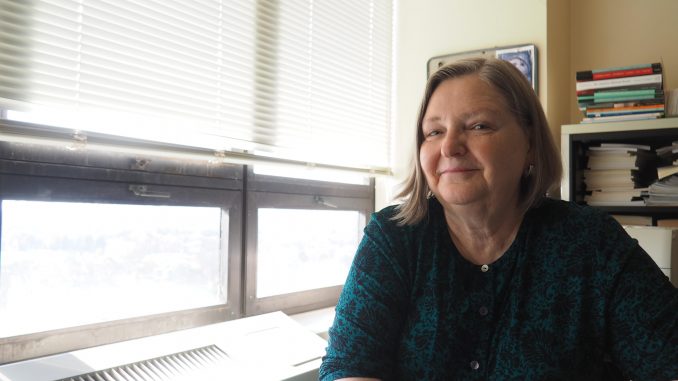
The New Paltz Community Center welcomed Susan Ingalls Lewis to enlighten listeners on the historic roles of women besides those typically discussed within the history of the woman’s suffrage movement.
On Nov. 1 at 7 p.m. the SUNY New Paltz associate professor of history held a talk entitled “Beyond Susan B. Anthony,” in honor of the centennial of women voting in New York. Although the first official convention which demanded the vote, the Seneca Falls Convention, was held in 1848, it took until 1917 for the right to vote to actualize for women in New York.
“It was about the women who actually got the vote in New York State as opposed to Susan B. Anthony and Elizabeth Cady Stanton, and even Sojourner Truth,” Lewis said. “They died, they failed, they did not get women the vote. They were important, they were pioneers, but in fact, they were not successful.”
Lewis discussed the flaws in how we are taught women’s history. She explained “[There are] many layers of misconceptions that I was trying to address.”
Misconceptions pertaining particularly to the Seneca Falls Convention and the way that the suffrage movement’s history developed. Anthony and Stanton essentially wrote the history of the suffrage movement and “wrote everybody else out,” Lewis said.
“They were very single-minded in creating a history which focused around Seneca Falls,” Lewis added. “The final thing is: Susan B. Anthony did not actually attend Seneca Falls.”
Lewis discussed the importance of shedding light on these common misconceptions and historical fallacies.
“I am so tired of people sort of saying ‘Anything about women is good enough for women’s history,’” Lewis said. “Anything you say about women is great. ‘The woman walked out of the house,’ [then we say] ‘That’s amazing! How did she do that? Oh my god she was defying convention!’”
When studying the suffrage movement, there is a kind of tunnel vision which focuses on a select group of women. The movement was much larger, much more expansive and nuanced. Lewis added an apt comparison: “It’s as if we wanted to celebrate the Civil Rights Movement by only talking about Frederick Douglass.”
Lewis elaborated on possible consequences of this approach to looking at women’s movements.
“If we’re not going to study the people and what their strategies and tactics were, how are we going to learn what makes a successful movement?,” she said.
After being asked why illuminating these discrepancies is relevant contemporarily, Lewis felt that the centennial of women’s right to the vote in New York was significant.
“Are we going to use the centennial to research and to publicize a history that’s not known now? I feel that the woman’s suffrage movement is really important in American history,” Lewis said. “And yet, no one knows anything about it. And, to me, that suggests that we don’t really care about the most important, successful movement in women’s history.”
